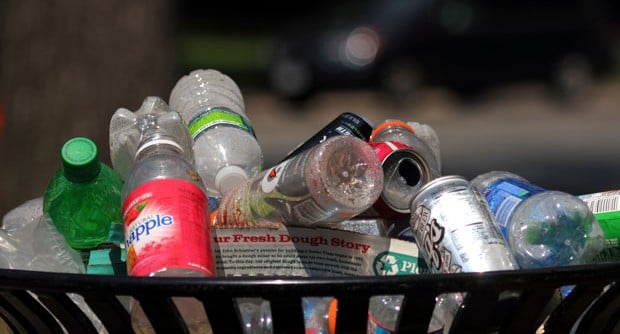Only 10 U.S. states have “bottle bills” requiring deposits on some beverage containers so consumers will return them. Those states recycle 70 percent of their bottles and cans, 2.5 times more than states without bottle bills. The beverage industry has spent millions fighting bottle bill legislation, even though beverage containers make up 5.6 percent of the U.S. waste stream. Credit: Mr. T. in DC, courtesy Flickr
![]()
Dear EarthTalk: Why don’t more states mandate deposits on beverage bottles as incentives for people to return them? Most bottles I’ve seen only list a few states on them.
— Alan Wu, Cary, NC
So-called bottle bills, otherwise known as container recycling laws, mandate that certain types of beverage containers require a small deposit (usually five or ten cents) at checkout beyond the price of the beverage itself. Customers can return the empty containers later and reclaim their nickels and dimes. The idea is to provide a financial incentive for consumers to recycle and to force industry to re-use the raw materials.
According to the Container Recycling Institute (CRI), a California-based non-profit which encourages the collection and recycling of packaging materials (and runs the website BottleBill.org), the benefits of bottle bills include: supplying recyclable materials for a high-demand market; conserving energy, natural resources and landfill space; creating new businesses and green jobs; and reducing waste disposal costs and litter. The 10 U.S. states that currently have container recycling laws recycle at least 70 percent of their bottles and cans; this amounts to a recycling rate 2.5 times higher than in states without bottle bills.
Beverage containers make up a whopping 5.6 percent of the overall U.S. waste stream, so every bottle and can that gets recycled counts toward freeing up landfill space. And CRI reports that beverage containers account for some 20 percent of the greenhouse gas emissions resulting from landfilling municipal solid waste and replacing the wasted products with new ones made from virgin feedstock. So by promoting more recycling, bottle bills indirectly reduce our carbon footprints.
The 10 U.S. states with bottle bills are California, Connecticut, Hawaii, Iowa, Maine, Massachusetts, Michigan, New York, Oregon and Vermont. Delaware’s legislature repealed its bottle bill after almost three decades on the books last year as the state’s bottle recycling rate had dropped to just 12 percent due to more and more retailers refusing to deal with the hassle of accepting returned containers. In place of its bottle bill, Delaware enacted a $0.04/bottle recycling fee that will help defray the costs of starting up a curbside recycling pickup system to service the entire state.
“We are extremely disappointed they chose to repeal their law, rather than enforce it,” reported CRI’s Susan Collins, adding that the new fee places a burden on consumers only. “Consumers will be subsidizing the producers and that is unfair.” CRI supports “extended producer responsibility” where producers and consumers together pay for the life cycle costs of product packaging.
Beyond Delaware, the main reason bottle bills haven’t caught on is because of opposition to them by the beverage industry, which doesn’t want to bear the costs of recycling and claims that the extra nickel or dime on the initial cost of the beverage is enough to turn potential customers away. The U.S. Public Interest Research Group (USPIRG) found that the beverage industry and its representatives spent about $14 million in campaign contributions aimed at defeating a national bottle bill between 1989 and 1994. Meanwhile, members of a Senate committee who voted against national bottle bill legislation in 1992 received some 75 times more in beverage-industry PAC money than those who voted in favor of the bill.
CONTACTS: Container Recycling Institute, www.container-recycling.org; USPIRG, www.uspirg.org.
EarthTalk® is written and edited by Roddy Scheer and Doug Moss and is a registered trademark of E – The Environmental Magazine (www.emagazine.com). Send questions to: [email protected]. Subscribe: www.emagazine.com/subscribe. Free Trial Issue: www.emagazine.com/trial.








